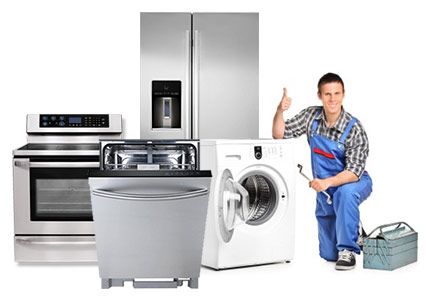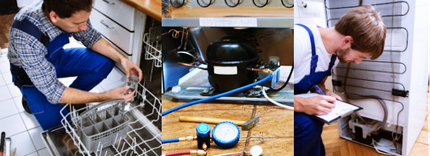The Ultimate Overview to Comprehending Home Appliance Repair in the house
When your refrigerator stops cooling down or your stove rejects to warmth, it can feel frustrating. Understanding device repair work in the house can save you time and money. You'll find out to acknowledge symptoms, utilize crucial tools, and follow a systematic troubleshooting process. However prior to you start, there are essential security precautions you need to take right into account. What are one of the most usual troubles, and how can you fix them? Let's check out the basics.
Common Device Troubles and Their Signs
When your home appliances start acting up, it's vital to acknowledge the indications beforehand. Overlooking them can result in larger problems and expensive repairs. For example, if your fridge isn't cooling down appropriately, you may notice warm places or condensation forming. This might show a failing compressor or an obstructed vent.Your dish washer may show problems with unclean meals or unusual sounds throughout cycles. If you hear grinding or clanking, it's time to investigate.A cleaning equipment that will not rotate or drain pipes can leave you with soggy laundry, recommending a clogged drainpipe or a malfunctioning pump.Lastly, if your oven's temperature seems off or it takes forever to preheat, you may be dealing with a malfunctioning thermostat. By remaining alert to these symptoms, you can address problems prior to they escalate into major repair work.
Vital Devices for Home Appliance Fixing
When you're taking on home appliance repair work in your home, having the right devices is essential. Fundamental hand tools like screwdrivers and pliers will aid you take apart and fix numerous home appliances, while electric testing devices guarantee you're functioning securely with circuitry. Allow's go over what you require to begin on your repair trip.
Standard Hand Devices
Having the right devices is essential for efficient appliance fixing in the house. Beginning with a trusted screwdriver collection, consisting of both flathead and Phillips types, as screws prevail in home appliance assembly. Pliers are likewise important; they aid with gripping, turning, and cutting wires or little components. A set of needle-nose pliers can reach difficult situations conveniently. You'll need a great adjustable wrench for tightening up or loosening up nuts and bolts. An utility knife comes in handy for reducing with packaging or insulation. Ultimately, do not neglect a durable workbench or surface to securely arrange your devices and parts. With these basic hand devices, you'll be well-prepared to take on most home appliance repairs that come your method.
Electrical Testing Devices
Alongside standard hand tools, electric testing tools play an important function in home appliance fixing. These tools assist you diagnose electrical problems and assurance home appliances work safely. A multimeter is essential; it gauges voltage, existing, and resistance, allowing you to determine troubles rapidly. A non-contact voltage tester is one more must-have, letting you identify live cords without making straight get in touch with, boosting your security. Secure meters are excellent for gauging current flow in cords without separating them, saving you effort and time. In addition, circuit testers can swiftly check if outlets are working appropriately. By utilizing these gadgets, you'll streamline your troubleshooting process and improve your fixing skills, making home appliance maintenance a whole lot simpler.
Step-by-Step Guide to Diagnosing Device Issues
When your appliance acts up, it can be discouraging, however diagnosing the problem doesn't need to be overwhelming. You'll discover to recognize usual troubles and use efficient troubleshooting strategies. Allow's stroll via the steps to get your home appliance back in working order.
Typical Appliance Troubles

Fixing Strategies Discussed

Repairing Significant Kitchen Appliances: A Closer Look
Have you ever questioned just how to tackle typical issues with your kitchen home appliances? Repairing major kitchen area appliances like refrigerators, stoves, and dishwashers can be easier than you think. Begin by recognizing the issue-- whether it's a refrigerator not cooling down or a stove that will not heat. Typically, a basic reset or inspecting the source of power can solve the issue.For fridges, clean the condenser coils and inspect the door seals. If your stove's not heating, examine the heating element and thermostat. Dishwashers might just require a clean filter or a reset to get them back in action. Always disconnect the appliance prior to diving right into repairs to assure your safety.Don' t fail to remember to consult the customer handbook for specific fixing pointers connected to your design. With a little perseverance and the right tools, you can with confidence tackle appliance repairs and conserve cash at the same time!

Troubleshooting Washing Devices: Tips and Techniques
When your laundry devices begin breaking down, it can really feel overwhelming, yet troubleshooting them doesn't need to be a headache. Beginning by checking the power supply. Validate the home appliance is plugged in and the outlet is working. Next off, inspect the door or cover button; a damaged switch can stop the maker from operating.For washing machines, if it's not rotating, look for out of balance tons. Redistributing the garments may resolve the concern. If your clothes dryer isn't heating, clean the lint filter and examine the air vent for blockages.Listen for uncommon noises; they can indicate a trouble. If your appliance is dripping, check the tubes for splits or loose links. Record any error codes presented on electronic displays, as they can direct you in recognizing the issue. Lastly, get in touch with the user handbook for particular repairing tips more info connected to your design.
Safety And Security Precautions to Take During Fixes
Before you start any kind of appliance fixings, it's important to focus on security to stop crashes or injuries. Initially, disconnect the device or shut off the breaker to assure no power reaches it while you function. Usage insulated devices to decrease the danger of electric shock. Use safety goggles and gloves to safeguard on your own from sharp edges or debris (Dependable Refrigeration & Appliance Repair Service Dryer repair near me).Make particular your work area is neat and well-lit, so you can see what you're doing. Keep children and family pets far from the area to avoid diversions and prospective risks. If you're handling gas home appliances, be extra careful; look for leakages prior to proceeding.Take your time, and don't rush with repairs. If you feel unpredictable regarding any type of action, it's far better to pause and research study than to presume. Following these precautions will certainly aid create a more secure setting for your do it yourself home appliance fixing task
When to Call a Specialist for Help
Exactly how do you know if it's time to call an expert for home appliance repair work? If you've attempted basic troubleshooting without success, it's a clear sign. As an example, if your device still won't begin or reveals uncommon noises after resetting it, do not be reluctant to look for expert help.When you observe leaks, smoke, or melting smells, prioritize safety and call a pro immediately. These concerns can cause even more considerable damages or pose risks to your home.Also, if your appliance is under warranty, getting in touch with a specialist is often the most effective route. They can assure that fixings won't invalidate your service warranty, conserving you cash in the long run.Finally, if you're uncertain or awkward with intricate repair work, it's smart to leave it to the experts. Remember, taking on difficult issues without the right expertise can cause expensive blunders. Depend on a professional when in uncertainty!
Regularly Asked Questions
Exactly How Can I Prevent Appliance Problems in the Future?
To stop home appliance issues in the future, you ought to carry out normal maintenance, check for deterioration, clean filters, and prevent overloading. Remaining proactive will certainly aid extend their life expectancy and keep them running smoothly.
What Are the Most Typical Do It Yourself Home Appliance Repair Mistakes?
You might forget safety and security preventative measures, skip troubleshooting steps, or utilize inaccurate tools when attempting DIY home appliance repairs. Hurrying the process or overlooking manufacturer guidelines can result in even more substantial issues and expensive errors. Stay person and educated!
Exactly how Do I Know if a Part Needs Substitute?
You can inform if a part requires substitute by looking for uncommon noises, leakages, or inconsistent performance. If the appliance has a hard time to operate properly or reveals noticeable damage, it's most likely time for a replacement.
Can I Use Generic Parts for Appliance Repairs?
Yes, you can utilize generic components for device repairs, but identify they work - Fixes washers and dryers Oro valley Dependable Appliance Repair. Generic parts might save you money, yet they can impact efficiency or durability, so weigh your choices carefully prior to deciding
What Service Warranties Cover Appliance Services?
A lot of device service warranties cover repair work for producing issues, however they usually exclude damage from misuse. Examine your service warranty terms carefully, as some might call for utilizing certified service technicians and original components for coverage to continue to be valid.